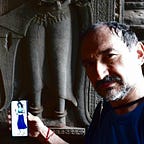Story World Research in Shikoku
Dateline: October 1984
Jofuki-ji was a big disappointment… the temple was quite nice, but the hostel was closed… the priest spoke bad English and told me to leave… he was a real asshole and it was a shame. But Zen allows assholes to be assholes.
The next morning, a breathtaking view awaited me. After breakfast, I hiked up the mountain. Turquoise streams bubbled and flowed towards the flatlands of the island…
Ejaculations of orange, yellow, and brown leaves erupted in the tall forests that clung tightly to the ghost mountains surrounding them.
I knew I was in the right place.
I walked towards a nearby temple and was impressed by its serene grandeur. Guardian spirits greeted me with their laughing wrath at the temple entrance… how fitting!
Little buddhas were scattered in a corner of the temple courtyard…a huge temple bell stood dormant nearby…
I was dreaming…
thinking of the schoolgirl in her uniform sneaking a smoke on the train I had taken last night.
Shikoku was the center of an ancient pilgrimage route that the Japanese still considered holy. Kobo Daishi, a Zen master had brought Buddhism from China. Eighty-eight temples that he frequented were on this pilgrimage route. It took over a month to cover them by foot and completing the journey was considered auspicious.
Drum roll…
The Naruto German house intrigued me. German prisoners of war were held here during the First World War, all of whom had been captured in China.
I was given a tour by Abe-san who had studied political science at UCLA. His professor had been a Jew and his father had been a Naruto prisoner.
The German prisoners were treated royally and Abe-san had a high regard for German culture.
That’s not surprising… Japan and Germany had a lot in common.
Both cultures fell victim to the same kind of uneven socioeconomic development in the 19th century.
There was a high literacy rate in these countries before the usual modern urbanization cycle could produce a proletariat working class.
This new workforce was still psychologically small-town and rural.
The need for security in the city led to unconscious father-seeking. The shocked but educated peasant mind tended towards unsavory forms of politics.
I asked Mr. Abe-san why the Japanese in Nanjing went completely berserk. “ Oh, the soldiers needed to blow off steam, you know. Every Japanese was forced into a straitjacket here at home….”
I shuddered.
Could this be the same culture that had created the subliminal art of haiku?
